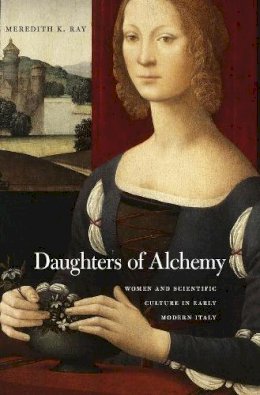8%OFF
Stock image for illustration purposes only - book cover, edition or condition may vary.
Daughters of Alchemy: Women and Scientific Culture in Early Modern Italy (I Tatti Studies in Italian Renaissance History)
Meredith K. Ray
FREE Delivery in Ireland
Description for Daughters of Alchemy: Women and Scientific Culture in Early Modern Italy (I Tatti Studies in Italian Renaissance History)
Hardcover. Meredith Ray shows that women were at the vanguard of empirical culture during the Scientific Revolution. They experimented with medicine and alchemy at home and in court, debated cosmological discoveries in salons and academies, and in their writings used their knowledge of natural philosophy to argue for women's intellectual equality to men. Num Pages: 291 pages. BIC Classification: JFSJ1; PDX. Category: (G) General (US: Trade). Dimension: 245 x 164 x 29. Weight in Grams: 570.
The era of the Scientific Revolution has long been epitomized by Galileo. Yet many women were at its vanguard, deeply invested in empirical culture. They experimented with medicine and practical alchemy at home, at court, and through collaborative networks of practitioners. In academies, salons, and correspondence, they debated cosmological discoveries; in their literary production, they used their knowledge of natural philosophy to argue for their intellectual equality to men.
Meredith Ray restores the work of these women to our understanding of early modern scientific culture. Her study begins with Caterina Sforza’s alchemical recipes; examines the sixteenth-century vogue for “books ... Read moreof secrets”; and looks at narratives of science in works by Moderata Fonte and Lucrezia Marinella. It concludes with Camilla Erculiani’s letters on natural philosophy and, finally, Margherita Sarrocchi’s defense of Galileo’s “Medicean” stars.
Combining literary and cultural analysis, Daughters of Alchemy contributes to the emerging scholarship on the variegated nature of scientific practice in the early modern era. Drawing on a range of under-studied material including new analyses of the Sarrocchi–Galileo correspondence and a previously unavailable manuscript of Sforza’s Experimenti, Ray’s book rethinks early modern science, properly reintroducing the integral and essential work of women.
Show Less
Product Details
Publisher
Harvard University Press
Place of Publication
Cambridge, Mass, United States
Shipping Time
Usually ships in 4 to 8 working days
About Meredith K. Ray
Meredith K. Ray is Associate Professor of Italian at the University of Delaware.
Reviews for Daughters of Alchemy: Women and Scientific Culture in Early Modern Italy (I Tatti Studies in Italian Renaissance History)
[A] timely book.
Jennifer Rampling
Nature
A pioneering text that brings together unheard, forgotten, or simply unexamined voices of intellectual women who operated as practitioners, authors, and patrons of science—that is, women who gave themselves the opportunity to ‘philosophize with their hands’—before the Enlightenment…This is a learned book with a well-argued thesis, convincing research, and lucid writing…Daughters ... Read moreof Alchemy should be required reading for anyone interested in discussing scientific work of the early modern period in Italy.
Valeria Finucci
Renaissance and Reformation
A sustained meditation on how and why women in early modern Italy pursued science. Ray examines the presence of women in the scientific culture of the late fifteenth through the early seventeenth centuries, from alchemy, medicine, and books of secrets to natural history, natural philosophy, and astronomy. Daughters of Alchemy invites readers to discern women’s voices—what they knew and what they wanted to know, what they wrote, read, and discussed—in the Renaissance’s conversation about the natural world.
Paula Findlen, author of Early Modern Things: Objects and Their Histories, 1500–1800 This original, fascinating study brings together in one place six compelling stories of Italian women who were important players in the production and transmission of scientific knowledge (especially in the areas of alchemy, and early forms of chemistry, biology, and botany) in early modern Europe. Ray’s research demonstrates not only the inherent challenges gender, social class, and religious affiliation played in this arena, but the creative solutions and unique strengths such challenges inspired in these early modern thinkers as they operated within the domestic, commercial, and academic spheres. At the heart of Ray’s analysis is the literary: a tool and vehicle powerfully used by the women Ray studies in their scientific discourse. Scholars of Italian Literature, Renaissance Studies, and Women’s Studies will find Daughters of Alchemy particularly of interest.
Arielle Saiber, author of Giordano Bruno and the Geometry of Language Show Less

